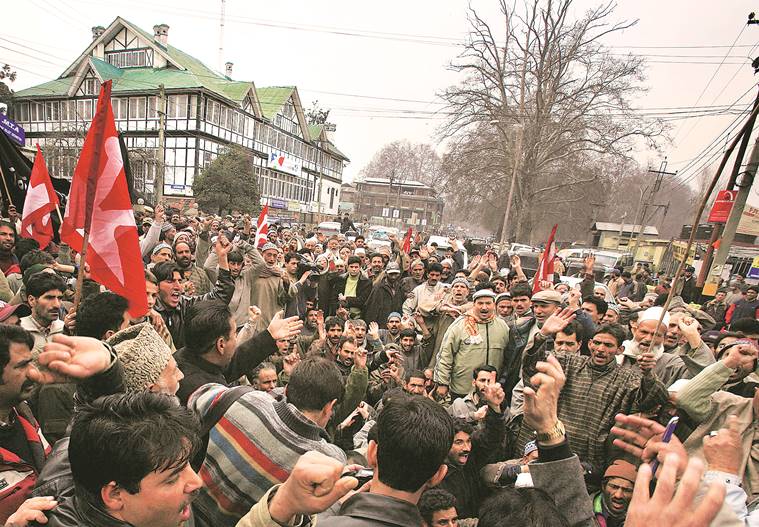 Front cover of A Desolation Called Peace: Voices from Kashmir.
Front cover of A Desolation Called Peace: Voices from Kashmir.
Title: A Desolation Called Peace: Voices from Kashmir
Author: Edited by Ather Zia & Javaid Iqbal Bhat
Publication: Harper Collins India
Pages: 296
Price: Rs 499
Before it was a Union Territory, before it was a military camp and even before it was the idyllic frontier for a now-besieged idea of the Indian republic — secular, federal and socialist — Kashmir was something else. It was a place of originality and ideas — more a port at the confluence of great civilisational powers than a frontier. The essays in A Desolation Called Peace: Voices from Kashmir, edited by Ather Zia and Javaid Iqbal Bhat, seem acutely conscious of that past, and what losing it has meant.
In the popular imagination, as well as among journalists and academics in the rest of India, the constant negotiation with the country’s only Muslim-majority state encountered a decisive rupture in 1989. From then on, militancy, the forced exodus of Kashmiri pandits from the Valley and an ideological-security governmentality have trumped any other form of political engagement.
 A protest in Kashmir. (Express Archives)
A protest in Kashmir. (Express Archives)
The central theme, across the essays by journalists, writers, poets and academics from Kashmir is that the popular Indian imagination is wrong. The editors’ attempt is to clearly show how 1989, far from being a rupture, was an almost logical consequence of the betrayals of the Indian state from 1947 onwards. The writers are young and old, men and women, pandits and Muslims — and the sheer diversity of their accounts and analysis makes it clear that Kashmir has never been a political or cultural monolith.
The opening essay by professor G R Malik, for example, frames the discourse well: Beginning with the great betrayal by Nehru, and Sheikh Abdullah’s perceived naivety about his friends’ democratic credentials, Kashmiris have nurtured the hope of being free, a hope that has been constantly belied. Elections have been rigged, puppet chief ministers have been installed by New Delhi and the might of the Indian state has been used to suppress a people.
The jailing of Abdullah and the installation of Mohammad Bakshi is the first coup by India, as Mohammad Junaid points out, and the memories of that time were fresh in 1989. Mona Bhan’s essay paints a vivid picture of how azadi was an aspiration not merely of the Muslims in the Valley but equally of the Pandits. In fact, Sheikh Abdullah’s Naya Kashmir — his land reforms, secularism and socialism — was far more progressive than anything that happened in India and continues to form the bedrock of the relative prosperity that Kashmir enjoys.
Abdullah remains the central pole of Kashmir’s political idiom, imagination and discourse, despite his many compromises and the affinity among many in the region towards Pakistan. For contemporary politics, that holds an important lesson.
A Desolation Called Peace is essential reading for anyone interested in Kashmir. It is at once a lamentation, an analysis and an expression of the tragedy of modern state-making. And for the Indian government of the day, it is also a lesson about how to handle frontiers and how even a Machiavellian design requires subtlety. Why was there no violence till 1989? What made so many, despite the underlying current of resentment, support the Indian state — work in its universities, take its jobs, make relationships throughout the country?
The power of the Indian state, the core of its hegemony, was the ability to exploit differences and keep open at least a modicum of space for dialogue. It was an acknowledgement — no matter what the reality on the ground — that the desire for autonomy was legitimate. In fact, rather than being seen as an insult, the negotiation between India and Kashmir could have provided a roadmap for the future of federal relations across the country.
None of this, of course, is stated directly by the essays in the book. The insecure Indian of today will read of azadi and Pakistan, of a syncretic and diverse Islam that it does not understand and cry “anti-national!” But perhaps someday, if the wound of abrogation is healed, these essays will preserve the memory of what could be.